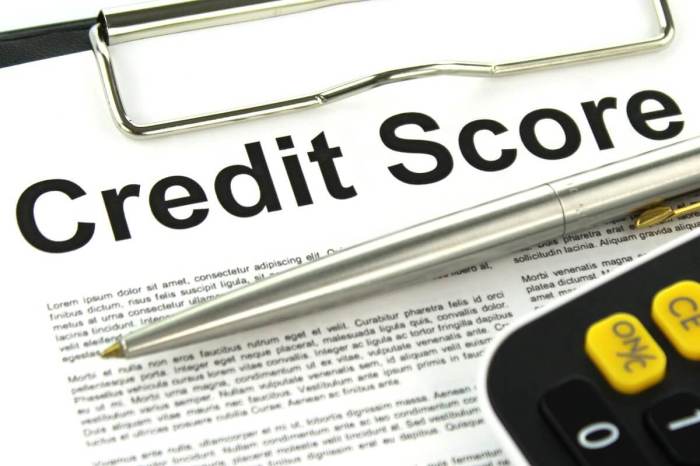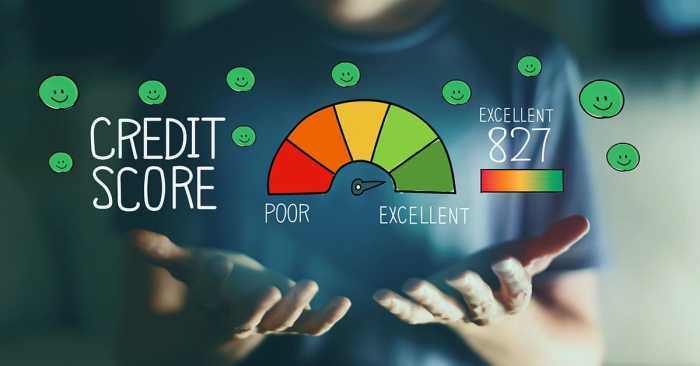
Navigating the complexities of student loan repayment can feel overwhelming, especially when considering its significant impact on your credit score. Understanding how your payment history affects your creditworthiness is crucial for long-term financial health. This guide delves into the mechanics of student loan debt’s influence on your credit, offering strategies for responsible repayment and highlighting the severe consequences of default.
From the intricacies of credit scoring models to the various repayment plans available, we’ll explore practical steps to protect your credit while managing your student loan debt. We’ll also examine the correlation between student loan debt and other financial obligations, illustrating how responsible management can positively influence your overall creditworthiness and future financial opportunities.
How Student Loans Impact Credit Scores

Student loans, while essential for many pursuing higher education, significantly influence your credit score. Understanding how these loans affect your credit is crucial for responsible financial management and achieving a healthy credit profile. This section will detail the mechanics of this impact, exploring various scoring models and illustrating the consequences of different payment behaviors.
Student Loan Payment Mechanics and Credit Scores
Your student loan payment history is a major factor in determining your credit score. Credit bureaus, such as Equifax, Experian, and TransUnion, collect information about your loan accounts, including the loan type, balance, payment history, and the date the account was opened. This information is then used by various credit scoring models to calculate your credit score. Consistent on-time payments demonstrate responsible credit behavior, positively influencing your score. Conversely, late or missed payments negatively impact your score, potentially leading to serious financial consequences. The length of your credit history, which includes your student loan accounts, also plays a role. A longer history with consistent positive payments builds a strong credit profile.
Credit Scoring Models and Student Loan Debt Weighting
Several credit scoring models exist, each with its own algorithm for calculating a credit score. While the specific formulas are proprietary, it’s known that payment history is a significant factor across all models. For example, FICO scores, widely used by lenders, consider payment history as one of the most influential factors. The weight assigned to student loan debt varies depending on factors such as the amount of debt relative to your total credit, the age of the accounts, and your overall payment history. Generally, responsible management of student loan debt, demonstrated through consistent on-time payments, will positively influence your score across all major models.
Impact of Various Payment Histories on Credit Scores
On-time payments consistently contribute to a higher credit score. Regularly paying your student loans on time demonstrates financial responsibility, building a positive credit history. Late payments, even if only by a few days, can negatively affect your score. Missed payments have a significantly more detrimental impact, potentially leading to a substantial drop in your score. Repeated late or missed payments can severely damage your credit, making it harder to obtain loans or credit cards in the future with favorable terms. For example, a single missed payment might lower your score by 50-100 points, depending on your overall credit profile and the scoring model used. Consistent late payments could result in even more significant score reductions.
Comparison of Federal and Private Student Loans
| Loan Type | Payment History Impact | Credit Score Impact | Potential Consequences |
|---|---|---|---|
| Federal Student Loans | Late or missed payments reported to credit bureaus; impact similar to other loans. | Negative impact on credit score, proportional to the severity and frequency of late/missed payments. | Difficulty securing future loans, higher interest rates, potential default and negative collection actions. |
| Private Student Loans | Late or missed payments reported to credit bureaus; impact similar to other loans. | Negative impact on credit score, proportional to the severity and frequency of late/missed payments. | Difficulty securing future loans, higher interest rates, potential default, negative impact on credit report, damage to credit history, and potential legal action. |
Managing Student Loan Debt to Protect Credit
Successfully navigating student loan repayment is crucial for building a strong credit history. Failing to manage these loans effectively can significantly impact your credit score, hindering your ability to secure loans, rent an apartment, or even get certain jobs. This section Artikels strategies for responsible repayment and proactive credit monitoring to mitigate these risks.
Responsible Student Loan Repayment Strategies
Prioritizing on-time payments is paramount. Even a single missed payment can negatively affect your credit score. Establishing a budget that comfortably accommodates your monthly student loan payments is essential. This might involve tracking expenses, identifying areas for potential savings, and prioritizing loan repayment within your overall financial plan. Consider automating your payments to eliminate the risk of forgetting deadlines. Consistent, timely payments demonstrate financial responsibility and contribute positively to your credit profile.
Student Loan Repayment Plan Options
Several repayment plans cater to different financial situations. The standard repayment plan involves fixed monthly payments over a 10-year period. While this offers the shortest repayment timeline, it might result in higher monthly payments. Income-driven repayment plans (IDR), such as Income-Based Repayment (IBR), Pay As You Earn (PAYE), and Revised Pay As You Earn (REPAYE), tie monthly payments to your income and family size. These plans typically result in lower monthly payments but extend the repayment period, potentially leading to higher total interest paid. Deferment or forbearance temporarily postpones payments but usually accrues interest, which is added to your principal balance. Careful consideration of your current financial circumstances and long-term financial goals is crucial in selecting the most appropriate repayment plan. For example, a recent graduate with a low income might benefit from an IDR plan, while someone with a stable, higher income might prefer the standard plan to minimize the total interest paid.
Building Credit History Alongside Student Loan Repayment
While student loans are a form of credit, responsible management of these loans is only one piece of the puzzle. Building a diverse credit history is crucial for a strong credit score. This involves applying for and responsibly managing other forms of credit, such as credit cards. Always pay credit card balances in full and on time. Aim for a credit utilization ratio (the amount of credit used compared to the total credit available) below 30% to demonstrate responsible credit management. A balanced approach to credit management, combining responsible student loan repayment with the use of other credit products, can significantly enhance your overall credit profile.
Proactive Credit Report Monitoring
Regularly checking your credit reports is essential for identifying and addressing any errors or discrepancies related to your student loans. You are entitled to a free credit report from each of the three major credit bureaus (Equifax, Experian, and TransUnion) annually through AnnualCreditReport.com. Review your reports meticulously for accuracy, ensuring that all student loan information, including payment history and balances, is correctly reported. If you find any errors, promptly contact the respective credit bureau and your loan servicer to initiate the correction process. Consistent monitoring allows for early detection and resolution of potential issues, safeguarding your credit score. A step-by-step guide might involve: (1) Obtaining your free credit reports, (2) Carefully reviewing each report for accuracy regarding your student loans, (3) Documenting any discrepancies found, (4) Contacting the credit bureau and your loan servicer to report errors, (5) Following up on the correction process to ensure the issues are resolved.
The Effect of Defaulting on Student Loans
Defaulting on student loans carries severe and long-lasting consequences, significantly impacting your financial well-being and creditworthiness. It’s a situation to be avoided at all costs through proactive planning and responsible debt management. Understanding the implications of default is crucial for making informed decisions about your student loan repayment.
Defaulting on your student loans will severely damage your credit score. This negative impact extends far beyond the immediate financial repercussions. The consequences can affect your ability to secure future loans, rent an apartment, or even obtain certain jobs.
Impact on Credit Reports and Scoring
A default is reported to all three major credit bureaus (Equifax, Experian, and TransUnion). This negative mark remains on your credit report for seven years, significantly lowering your credit score. The drop in your score can make it incredibly difficult to obtain new credit, such as mortgages, auto loans, or even credit cards, at favorable interest rates. Furthermore, lenders may view you as a high-risk borrower, leading to denial of credit applications altogether. The severity of the score decrease varies depending on the amount of the defaulted loan and your overall credit history. A significant default can result in a substantial drop, potentially hundreds of points.
Federal vs. Private Student Loan Default Recovery Processes
The recovery processes for defaulted federal and private student loans differ significantly. With federal loans, the government employs various collection methods, including wage garnishment, tax refund offset, and even the seizure of assets. The Department of Education may also refer the debt to a collection agency. In contrast, private lenders typically utilize more aggressive collection tactics, such as lawsuits and judgments, to recover the debt. They may also pursue legal action to garnish wages or seize assets, though the specific methods depend on the lender and state laws. The collection practices of private lenders can be more aggressive than those of the federal government, potentially resulting in more immediate and severe consequences.
Long-Term Repercussions of Student Loan Default
- Severely Damaged Credit Score: A significant and prolonged negative impact on your credit score, making it challenging to obtain credit for years to come.
- Difficulty Securing Future Loans: Obtaining mortgages, auto loans, or personal loans becomes significantly more difficult, if not impossible, due to the poor credit history.
- Higher Interest Rates: Even if you qualify for loans, you’ll likely face significantly higher interest rates, increasing the overall cost of borrowing.
- Wage Garnishment: A portion of your wages can be legally seized to repay the defaulted loan, significantly impacting your income and financial stability.
- Tax Refund Offset: Your federal and/or state tax refund may be seized to repay the defaulted loan.
- Legal Action: Private lenders may take legal action, including lawsuits and judgments, to recover the debt. This can lead to additional fees and costs.
- Difficulty Renting an Apartment: Landlords often perform credit checks, and a poor credit score due to default can make finding suitable housing challenging.
- Limited Employment Opportunities: Some employers conduct credit checks as part of the hiring process, and a poor credit history can negatively impact your job prospects.
Student Loan Debt and its Correlation with Other Financial Factors

Student loan debt significantly impacts various aspects of an individual’s financial life, extending far beyond the monthly payment. Its influence intertwines with other forms of debt, credit utilization, and overall creditworthiness, affecting access to future credit opportunities and financial stability. Understanding these interrelationships is crucial for effective financial planning and responsible debt management.
Student loan debt often interacts complexly with other debts, such as credit card debt and mortgages. The size of the student loan balance directly affects an individual’s ability to manage other financial obligations. For example, a large student loan payment can reduce the amount available for credit card payments, increasing the risk of delinquency and negatively impacting credit scores.
The Interplay of Student Loan Debt and Other Debt Types
High student loan balances can strain an individual’s budget, leaving less disposable income to manage other debts. This can lead to a domino effect, where missed payments on one debt type negatively affect the others. For instance, someone struggling to make both student loan and credit card payments might fall behind on both, resulting in a significant decline in their credit score. Furthermore, the presence of significant student loan debt might make it more difficult to secure a mortgage or auto loan, as lenders consider the total debt burden when assessing risk. A person with a substantial student loan payment and a high credit card balance might find it challenging to qualify for a mortgage, even if their income is sufficient, because their debt-to-income ratio (DTI) will be too high.
Student Loan Debt’s Influence on Credit Utilization Ratios
Credit utilization ratio, the percentage of available credit used, is a crucial factor in credit scoring. High student loan balances can indirectly inflate this ratio by reducing the available credit on other accounts. For example, if an individual has a $10,000 credit card limit and carries a $5,000 balance, their utilization is 50%. However, if they also have a large student loan payment, they might be less likely to pay down their credit card balance aggressively, potentially pushing their utilization ratio even higher, harming their credit score. This is because a high utilization ratio suggests a higher risk to lenders.
Impact of Student Loan Debt on Credit Applications
Lenders assess an applicant’s overall financial health, including student loan debt, when evaluating applications for mortgages, auto loans, or other credit products. A large student loan balance can negatively impact the approval chances, even if the applicant meets other creditworthiness criteria. For instance, someone with a substantial student loan payment might be offered a higher interest rate on a car loan or might not qualify for a mortgage at all, reflecting the increased risk associated with their high debt load. A person with a $50,000 student loan and a $60,000 annual income might find it difficult to secure a mortgage for a $300,000 home because their debt-to-income ratio would be high.
Debt-to-Income Ratio and Student Loans
The debt-to-income ratio (DTI) is the percentage of monthly income used to pay debts. High student loan payments significantly contribute to a higher DTI, which is a critical factor in credit scoring and loan approvals. A high DTI indicates less financial flexibility and increased risk of default. For example, an individual with a $1,000 monthly student loan payment and a $3,000 monthly income has a DTI of 33%. While this is not exceptionally high, adding other debt obligations like a car loan or credit card debt can quickly push the DTI above acceptable levels for many lenders, making it difficult to secure additional credit. This can severely limit opportunities for homeownership or other significant purchases.
Illustrative Scenarios and Their Impact
Understanding the impact of student loan management on credit scores is best illustrated through contrasting scenarios. One depicts effective management leading to positive credit outcomes, while the other highlights the negative consequences of poor management. These examples demonstrate the importance of proactive and responsible debt handling.
Effective Student Loan Management: A Positive Scenario
Sarah, a recent graduate with a degree in engineering, diligently budgeted her finances. She secured a well-paying job and immediately began making on-time payments on her $50,000 in student loans. She chose a repayment plan that aligned with her income and meticulously tracked her payments. Her credit report consistently showed a history of on-time payments. Over the course of five years, her credit score steadily increased from a starting point of 700 to a strong 780. This improvement reflected her responsible borrowing and repayment behavior. A visual representation of her credit score trajectory would show a gradual, upward sloping line, steadily increasing over the five-year period. The line would start at 700 and end at 780, demonstrating consistent positive movement.
Ineffective Student Loan Management: A Negative Scenario
Mark, also a recent graduate, struggled with financial planning. He faced unexpected expenses and missed several student loan payments. These missed payments resulted in late fees and a damaged credit history. His initial credit score of 680 rapidly declined. After two years of inconsistent payments and eventual default on his $40,000 in student loans, his credit score plummeted to below 550. This significantly impacted his ability to secure a loan for a car or a mortgage. A visual representation of Mark’s credit score would show a sharp downward trend. The line would begin at 680, then show several dips representing missed payments, culminating in a steep drop to below 550 after default. The line would remain consistently low, reflecting the lasting impact of his poor credit history.
Final Thoughts

Successfully managing student loan debt requires proactive planning and a thorough understanding of its implications for your credit score. By employing responsible repayment strategies, monitoring your credit reports diligently, and avoiding default, you can safeguard your financial future. Remember, a strong credit score is a valuable asset, opening doors to various financial opportunities. Take control of your student loan debt today and build a brighter financial tomorrow.
Questions Often Asked
What is the difference between federal and private student loans in terms of credit reporting?
Both federal and private student loans are reported to credit bureaus. However, the collection and default processes differ, impacting credit scores differently. Federal loans generally have more lenient repayment options and default processes than private loans.
How long does a student loan default stay on my credit report?
A student loan default can remain on your credit report for seven years from the date of the default. Even after removal, the negative impact may linger, making it harder to secure loans or credit cards.
Can I improve my credit score after a student loan default?
Yes, but it takes time and effort. Rehabilitating your loans, establishing a positive payment history on other accounts, and maintaining low credit utilization are crucial steps in rebuilding your credit.
What is a good credit utilization ratio, and how does student loan debt affect it?
A good credit utilization ratio is generally below 30%. High student loan balances can negatively impact this ratio if you also carry high balances on other credit accounts. Managing debt effectively is key to maintaining a healthy ratio.
